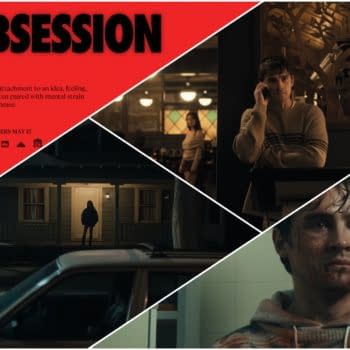Posted in: Movies, Recent Updates, Review | Tagged: film, helen hunt, john hawkes, lff, michael haneke
Love And Sex With Amour And The Sessions At The London Film Festival
Patrick Dane writes for Bleeding Cool
Amour
Amour was shown to a packed cinema with plenty of press rejected entry. Contributing to this popularity are two key points that you'll be able see on the poster: Amour won the Palm D'or at Cannes this year; and it was directed by perennial arthouse fave, Michael Haneke.
Beyond that hype, it is a strong film that features a pair of heart rending performances… but also a film that slowly suffocates itself.
The film follows Georges, played by Jean-Louis Trintignant, and Anne, played by Emmanuelle Riva. These octogenarians have been married for many decades.
The drama starts when Anne begins to have health problems, fuelled by a series of strokes and a decent into dementia. All Anne has to rely on his her husband, who has promised not to put her in a home.
Anne metamorphoses from a content elderly woman to a severely disabled wreck and Riva's performance is rather astonishing in certain scenes.
Trintignant has a more reserved role but as we definitely get to see and feel his burden grow. You won't find anyone complaining about either actor.
Amour is a brutally honest film. It does not shy away from showing a character's inner life slowly deteriorating. Anne transforms into something unrecognisable, and she does it right before our eyes.
Amour is, of course, about love. If we are lucky enough to ever stay in love and grow old with our partner, we too might see this degeneration. It's a powerful subject. It's human.
But Amour certainly has problems. Haneke's new film is trudge to an inevitable destination, which is very deliberate and the edit is not afraid to linger on a shot for over a minute. But this makes the film's relatively short running time quite exhausting.
Amour is a smartly crafted film that certainly has it's moments but due to the weightiness, some narrative meandering, a one-note tone and a vague ending it's hard to fully recommend.
The Sessions
Apparently The Sessions is 'Oscar bait.' Seems that a story about disabillity overcoming adversity, while also talking about sex, will alway have that label slapped on it early on. Nicely, though, the film's intentions never feel anything but genuine.
This is a film made for the love of its story, not in pursuit of plaudits. And it's just too good of a time for anything I remember really deserving to be called 'Oscar bait.'
The true story follows Mark, played by John Hawkes, who contracted polio when he was six years old. Now 38, he is a romantic poet and journalist who is confined to the support of an iron lung.
After a rather disastrous first attempt at romance, Mark is convinced that he will never get to have sex or find a woman for himself. However, he's soon being referred to a specialist, played by Helen Hunt, who will help him explore his sexual urges. The catch is that she's available for just a maximum of six sessions.
While this story could easily been played as a tearjerker, what we actually have is something rather sweet, right down to it's core. While it may not be a laugh a minute, it is certainly smile a minute.
Hawkes doesn't deliver the general 'disabled person schtick' but gives a performance is witty, plays it funny but also ridden with anxiety. Helen Hunt and William H. Macey put in less obviously distinctive but just as important performances.
Ben Lewin is a competent director but his true strength seems to be as a scriptwriter. There's a number of upsetting scenes but even in the darkest moments, the character of Mark is allowed to make the audience laugh.
The Sessions treats its characters with the upmost dignity against the background of a taboo subject but never loses sight of its own humanity and warmth. Recommended.















